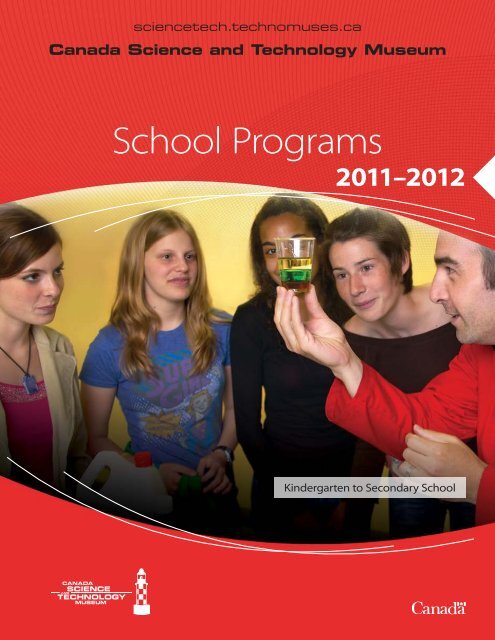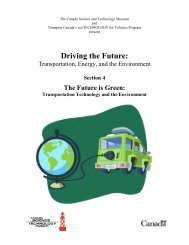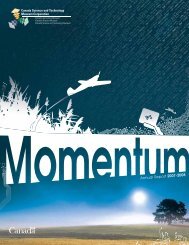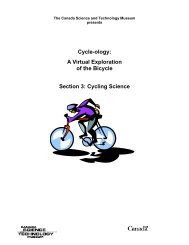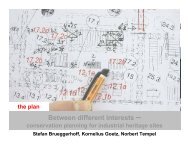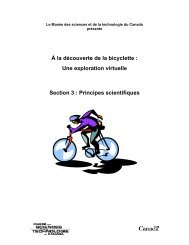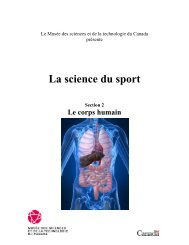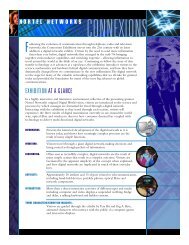Canada Science and Technology Museum
Canada Science and Technology Museum
Canada Science and Technology Museum
Create successful ePaper yourself
Turn your PDF publications into a flip-book with our unique Google optimized e-Paper software.
sciencetech.technomuses.ca<br />
<strong>Canada</strong> <strong>Science</strong> <strong>and</strong> <strong>Technology</strong> <strong>Museum</strong><br />
School Programs<br />
2011–2012<br />
Kindergarten to Secondary School
<strong>Canada</strong> <strong>Science</strong> <strong>and</strong> <strong>Technology</strong> <strong>Museum</strong><br />
Curriculum<br />
Connections<br />
2<br />
The <strong>Museum</strong>’s school programs meet many learning<br />
objectives for students from preschool through Grade 10/<br />
Cycle 2 (secondary). Profiling how science <strong>and</strong> technology<br />
affect society <strong>and</strong> the environment, these programs have<br />
a unique Canadian perspective, <strong>and</strong> offer students rich<br />
opportunities to explore, discover, <strong>and</strong> appreciate scientific<br />
achievement, with links to curricula in history, the social<br />
sciences, <strong>and</strong> math, as well as science <strong>and</strong> technology.<br />
Ontario<br />
Level. Structures <strong>and</strong> Mechanisms Matter <strong>and</strong> Energy Earth <strong>and</strong> Space Systems<br />
K Exploring Objects <strong>and</strong> Materials Pushing <strong>and</strong> Pulling Forces<br />
Liquids <strong>and</strong> Solids<br />
Earth’s Daily <strong>and</strong> Seasonal Cycles<br />
1 Material Objects <strong>and</strong> Everyday<br />
Structures<br />
Exploring Objects <strong>and</strong> Materials<br />
Structures <strong>and</strong> Shapes<br />
Curriculum Days<br />
Summer Fun Days<br />
2 Movement<br />
<strong>Science</strong> Seesaw <strong>and</strong> Simple Machines<br />
Curriculum Days<br />
3 Strong <strong>and</strong> Stable Structures<br />
Structures <strong>and</strong> Shapes<br />
Curriculum Days<br />
Summer Fun Days<br />
Energy in Our Lives<br />
Energy <strong>and</strong> Forces<br />
Curriculum Days<br />
Properties of Liquids <strong>and</strong> Solids<br />
Liquids <strong>and</strong> Solids<br />
Curriculum Days<br />
Summer Fun Days<br />
Forces Causing Movement<br />
Pushing <strong>and</strong> Pulling Forces<br />
Energy <strong>and</strong> Forces<br />
Curriculum Days<br />
Daily <strong>and</strong> Seasonal Changes<br />
Earth’s Daily <strong>and</strong> Seasonal Cycles<br />
Air <strong>and</strong> Water in the Environment<br />
Energy <strong>and</strong> Forces<br />
Liquids <strong>and</strong> Solids<br />
4 Pulleys <strong>and</strong> Gears<br />
Pulleys <strong>and</strong> Gears: Wonderful<br />
Machines<br />
Curriculum Days<br />
Summer Fun Days<br />
Light <strong>and</strong> Sound<br />
Looking at Light<br />
Sound Connexions<br />
Curriculum Days<br />
Summer Fun Days<br />
Reservations: 613-991-3053 or 1-866-442-4416
<strong>Canada</strong> <strong>Science</strong> <strong>and</strong> <strong>Technology</strong> <strong>Museum</strong><br />
Level. Structures <strong>and</strong> Mechanisms Matter <strong>and</strong> Energy Earth <strong>and</strong> Space Systems<br />
5 Forces Acting on Structures<br />
<strong>and</strong> Mechanisms<br />
Forces Acting on Structures<br />
Toying with <strong>Science</strong> <strong>and</strong><br />
<strong>Technology</strong> Show<br />
Curriculum Days<br />
Summer Fun Days<br />
Properties of <strong>and</strong> Changes<br />
in Matter<br />
Toying with <strong>Science</strong> <strong>and</strong><br />
<strong>Technology</strong> Show<br />
Properties of <strong>and</strong> Changes in Matter<br />
Summer Fun Days<br />
Curriculum Days<br />
Conservation of Energy<br />
<strong>and</strong> Resources<br />
Introduction to Electricity<br />
The Many Faces of Energy<br />
Curriculum Days<br />
Summer Fun Days<br />
6 Electricity <strong>and</strong> Electrical Devices<br />
Introduction to Electricity<br />
The Many Faces of Energy<br />
Curriculum Days<br />
Space<br />
Toying with <strong>Science</strong> <strong>and</strong><br />
<strong>Technology</strong> Show<br />
Probing the Skies<br />
Canadian Inventions <strong>and</strong> Innovations<br />
Curriculum Days<br />
Summer Fun Days<br />
3<br />
7 Form <strong>and</strong> Function<br />
Forces Acting on Structures<br />
Toying with <strong>Science</strong> <strong>and</strong><br />
<strong>Technology</strong> Show<br />
Canadian Inventions <strong>and</strong> Innovations<br />
<strong>Science</strong> <strong>and</strong> Engineering Olympics<br />
Summer Fun Days<br />
8 Systems in Action<br />
Toying with <strong>Science</strong> <strong>and</strong><br />
<strong>Technology</strong> Show<br />
Canadian Inventions <strong>and</strong> Innovations<br />
Pure Substances <strong>and</strong> Mixtures<br />
Substances, Mixtures, <strong>and</strong> Heat<br />
Toying with <strong>Science</strong> <strong>and</strong><br />
<strong>Technology</strong> Show<br />
Summer Fun Days<br />
Fluids<br />
Toying with <strong>Science</strong> <strong>and</strong><br />
<strong>Technology</strong> Show<br />
Amazing Fluids<br />
<strong>Science</strong> <strong>and</strong> Engineering Olympics<br />
Summer Fun Days<br />
Heat in the Environment<br />
Substances, Mixtures, <strong>and</strong> Heat<br />
Water Systems<br />
Amazing Fluids<br />
Level. Chemistry Physics Biology<br />
Earth <strong>and</strong> Space<br />
Systems<br />
9 Criminal <strong>Science</strong> Investigation<br />
<strong>Science</strong> <strong>and</strong> Engineering<br />
Olympics<br />
Electricity: Characteristics <strong>and</strong><br />
Applications<br />
<strong>Science</strong> <strong>and</strong> Engineering<br />
Olympics<br />
Biotechnology<br />
Days<br />
Studying the Universe<br />
10 Criminal <strong>Science</strong> Investigation<br />
Biotechnology Days<br />
<strong>Science</strong> <strong>and</strong> Engineering<br />
Olympics<br />
<strong>Science</strong> <strong>and</strong> Engineering<br />
Olympics<br />
Biotechnology<br />
Days<br />
sciencetech.technomuses.ca
<strong>Canada</strong> <strong>Science</strong> <strong>and</strong> <strong>Technology</strong> <strong>Museum</strong><br />
Primary<br />
Quebec<br />
4<br />
Mathematics,<br />
<strong>Science</strong> <strong>and</strong> <strong>Technology</strong><br />
Social <strong>Science</strong>s<br />
Cycle 1<br />
Cycles 2 <strong>and</strong> 3<br />
<strong>Science</strong> <strong>and</strong> <strong>Technology</strong><br />
Competency — To explore the world of science<br />
<strong>and</strong> technology<br />
The Material World<br />
Exploring Objects <strong>and</strong> Materials<br />
Liquids <strong>and</strong> Solids<br />
Pushing <strong>and</strong> Pulling Forces<br />
Energy <strong>and</strong> Forces<br />
Earth <strong>and</strong> Space<br />
Earth’s Daily <strong>and</strong> Seasonal Cycle<br />
Summer Fun Days<br />
Curriculum Days<br />
<strong>Science</strong> <strong>and</strong> <strong>Technology</strong><br />
Competency 1 — To propose explanations for or<br />
solutions to scientific or technology problems<br />
Competency 2 — To make the most of scientific <strong>and</strong><br />
technological tools, objects, <strong>and</strong> procedures<br />
The Material World<br />
Properties of <strong>and</strong> Changes in Matter<br />
The Many Faces of Energy<br />
Introduction to Electricity<br />
Sound Connexions<br />
Looking at Light<br />
<strong>Science</strong> Seesaw <strong>and</strong> Simple Machines<br />
Pulleys <strong>and</strong> Gears: Wonderful Machines<br />
Forces Acting on Structures<br />
Structures <strong>and</strong> Shapes<br />
Toying with <strong>Science</strong> <strong>and</strong> <strong>Technology</strong> Show<br />
Earth <strong>and</strong> Space<br />
Energy <strong>and</strong> Forces<br />
Probing the Skies<br />
Summer Fun Days<br />
Curriculum Days<br />
Geography, History, <strong>and</strong> Citizenship Education<br />
Competency 2 — Interpret change in a society<br />
<strong>and</strong> its territory<br />
Browsing the <strong>Museum</strong><br />
Transportation Technologies<br />
Canadian Inventions <strong>and</strong> Innovations to Discover<br />
What <strong>Museum</strong>s Do: Behind the Scenes<br />
In addition, all of our programs support the objective of Cycles 2 <strong>and</strong> 3, Competency 3 — To communicate in the<br />
languages used in science <strong>and</strong> technology.<br />
Reservations: 613-991-3053 or 1-866-442-4416
<strong>Canada</strong> <strong>Science</strong> <strong>and</strong> <strong>Technology</strong> <strong>Museum</strong><br />
Secondary<br />
Mathematics,<br />
<strong>Science</strong> <strong>and</strong> <strong>Technology</strong><br />
Cycle 1<br />
<strong>Science</strong> <strong>and</strong> <strong>Technology</strong><br />
Competency 1 — Seeks answers or solutions to<br />
scientific or technological problems<br />
Competency 2 — Makes the most of his/her<br />
knowledge of science <strong>and</strong> technology<br />
The Material World<br />
Toying with <strong>Science</strong> <strong>and</strong> <strong>Technology</strong> Show<br />
Substances, Mixtures, <strong>and</strong> Heat<br />
Amazing Fluids<br />
Summer Fun Days<br />
Earth <strong>and</strong> Space<br />
Probing the Skies<br />
Introduction to Electricity<br />
Summer Fun Days<br />
The Technological World<br />
Canadian Inventions <strong>and</strong> Innovations to Discover<br />
Forces Acting on Structures<br />
Summer Fun Days<br />
Cycle 1<br />
Social <strong>Science</strong>s<br />
History <strong>and</strong> Citizenship Education<br />
Competency 1 — Examines social phenomena<br />
from a historical perspective<br />
Competency 3 — Constructs his/her consciousness<br />
of citizenship through the study of history<br />
Browsing the <strong>Museum</strong><br />
Transportation Technologies<br />
Canadian Inventions <strong>and</strong> Innovations to Discover<br />
Coming of Age: <strong>Canada</strong> <strong>and</strong> the 1950s<br />
What <strong>Museum</strong>s Do: Behind the Scenes<br />
5<br />
<strong>Science</strong> <strong>and</strong> <strong>Technology</strong><br />
History <strong>and</strong> Citizenship Education<br />
Cycle 2<br />
Competency 1 — Seeks answers or solutions to<br />
scientific or technological problems<br />
Competency 2 — Makes the most of his/her<br />
knowledge of science <strong>and</strong> technology<br />
The Material World<br />
Electricity: Characteristics <strong>and</strong> Applications<br />
The Living World<br />
Criminal <strong>Science</strong> Investigation<br />
Cycle 2<br />
Competency 1 — Examines social phenomena<br />
from a historical perspective<br />
Competency 3 — Strengthens his/her exercise of<br />
citizenship through the study of history<br />
Browsing the <strong>Museum</strong><br />
Transportation Technologies<br />
Coming of Age: <strong>Canada</strong> <strong>and</strong> the 1950s<br />
What <strong>Museum</strong>s Do: Behind the Scenes<br />
Earth <strong>and</strong> Space<br />
Studying the Universe<br />
In addition, all of our programs support the objective of Competency 3 — To communicate in the languages used<br />
in science <strong>and</strong> technology.<br />
sciencetech.technomuses.ca
<strong>Canada</strong> <strong>Science</strong> <strong>and</strong> <strong>Technology</strong> <strong>Museum</strong><br />
Let’s Talk Energy — Engaging Ideas for <strong>Canada</strong>’s Future<br />
This national multi-year initiative explores <strong>Canada</strong>’s energy production, distribution, <strong>and</strong><br />
consumption, <strong>and</strong> the greening of the country’s energy network. A key element of this<br />
initiative is the new exhibition Energy: Power to Choose. School programs featuring<br />
this symbol are components of this initiative.<br />
6<br />
An exciting adventure in<br />
h<strong>and</strong>s-on learning<br />
The <strong>Museum</strong>’s programs <strong>and</strong> workshops are designed to inspire students <strong>and</strong><br />
bring your curriculum to life. Support materials, available upon reservation,<br />
help you make the most of these unique educational experiences.<br />
Preschool <strong>and</strong> JK<br />
An Invisible Attraction<br />
Preschool to JK<br />
Duration: 60 minutes<br />
Explore the wonderful world of magnets in this h<strong>and</strong>son<br />
workshop. Discover which materials are magnetic<br />
<strong>and</strong> which are not. Investigate the strengths of different<br />
magnets. Discover how to move an object using magnetic<br />
force, <strong>and</strong> learn the many ways in which magnets are<br />
used in our daily lives. (ST2)<br />
Reservations: 613-991-3053 or 1-866-442-4416<br />
K to Grade 3 • K to<br />
Cycle 2 (primary)<br />
Earth’s Daily <strong>and</strong><br />
Seasonal Cycles<br />
K to Grade 3 • K to Cycle 1 (primary)<br />
Duration: 60 minutes<br />
What is our primary source of heat <strong>and</strong> light How do<br />
Earth’s daily <strong>and</strong> seasonal cycles affect everyday life<br />
Giant Sun <strong>and</strong> Earth globes, <strong>and</strong> various activities,<br />
introduce concepts of heat, light, day, <strong>and</strong> night. Explore<br />
the changing seasons through h<strong>and</strong>s-on activities in the<br />
<strong>Museum</strong>’s inflatable planetarium. (ST37)<br />
Pushing <strong>and</strong> Pulling Forces<br />
K to Grade 3 • K to Cycle 1 (primary)<br />
Duration: 60 minutes<br />
What happens when you push or pull an object H<strong>and</strong>son<br />
activity stations illustrate how gravity, static, magnetic,<br />
<strong>and</strong> muscular forces cause objects to move. Apply<br />
different levels of force to objects <strong>and</strong> see them move,<br />
attract, repel, or change direction. Find out which forces<br />
are applied through direct contact <strong>and</strong> which interact at a<br />
distance. (ST51)<br />
Exploring Objects<br />
<strong>and</strong> Materials<br />
K to Grade 3 • K to Cycle 1 (primary)<br />
Duration: 60 minutes<br />
Can objects be made of more than one material Use your<br />
senses to identify objects by how they look <strong>and</strong> feel. How<br />
do you make paper, plastic, <strong>and</strong> glass Where do they<br />
come from H<strong>and</strong>s-on activities illustrate how materials<br />
are produced, recycled, <strong>and</strong> how they can be fastened<br />
together to form objects. (ST4)
<strong>Canada</strong> <strong>Science</strong> <strong>and</strong> <strong>Technology</strong> <strong>Museum</strong><br />
Liquids <strong>and</strong> Solids<br />
K to Grade 3 • K to Cycle 1 (primary)<br />
Duration: 60 minutes<br />
Investigate the properties of materials through an<br />
exploration of liquids <strong>and</strong> solids. Probe the differences<br />
between the three states of matter, interactions between<br />
liquids of different densities, solids that dissolve in liquids,<br />
<strong>and</strong> buoyancy. Design a boat <strong>and</strong> see how much weight it<br />
can support. (ST5)<br />
Energy <strong>and</strong> Forces NEW!<br />
Grades 1 to 3 • K to Cycle 2 (primary)<br />
Duration: 60 minutes<br />
Explore the role that the Sun, air, <strong>and</strong> water play in energy<br />
production. Discover how these natural forces are harnessed<br />
<strong>and</strong> their impact on our everyday lives. H<strong>and</strong>s-on activities<br />
reinforce the underst<strong>and</strong>ing that everything that happens<br />
is the result of some form of energy. (ST8)<br />
7<br />
<strong>Science</strong> Seesaw <strong>and</strong><br />
Simple Machines<br />
Grades 1 to 3 • Cycle 2 (primary)<br />
Duration: 60 minutes<br />
Explore the principles of force <strong>and</strong> movement with<br />
this introduction to simple machines <strong>and</strong> the effects of<br />
friction. Explore the terms work <strong>and</strong> load as you look<br />
at the basic principles of levers <strong>and</strong> inclined planes.<br />
Investigate a multitude of mechanical devices that have<br />
changed the way we live. (ST7)<br />
Structures <strong>and</strong> Shapes<br />
Grades 1 to 3 • Cycle 2 (primary)<br />
Duration: 60 minutes<br />
Experiment to discover the characteristics of different<br />
structures <strong>and</strong> how they are designed to meet specific<br />
needs. Try building a tower or bridging a river to<br />
learn which geometric shapes are the strongest. This<br />
workshop encourages students to use their problemsolving<br />
skills while exploring mechanical devices <strong>and</strong><br />
building structures. (ST9)<br />
Grades 4 to 8 •<br />
Cycle 2 (primary)<br />
to Cycle 1 (secondary)<br />
Probing the Skies<br />
Grades 4 to 6 • Cycle 2 (primary) to Cycle 1 (secondary)<br />
Duration: 75 minutes<br />
Explore the components of our Solar System—touch real<br />
meteorites <strong>and</strong> compare the relative size of planets <strong>and</strong><br />
asteroids. See the motions of the planets, Sun, Moon, <strong>and</strong><br />
constellations in the <strong>Museum</strong>’s inflatable planetarium,<br />
<strong>and</strong> discover their effects on cycles of day, night, seasons,<br />
<strong>and</strong> eclipses. See the tools of astronomy exploration in<br />
the Helen Sawyer Hogg Observatory. (ST10)<br />
Introduction to Electricity<br />
Grades 4 to 6 • Cycle 3 (primary) to Cycle 1 (secondary)<br />
Duration: 75 minutes<br />
What are current <strong>and</strong> static electricity Discover which<br />
materials are good conductors, <strong>and</strong> which are good<br />
insulators. Learn the role of simple circuit components<br />
<strong>and</strong> draw circuit diagrams. Use circuit boards to see how<br />
series <strong>and</strong> parallel circuits work, <strong>and</strong> how each is used.<br />
Measure the amount of electricity various light bulbs<br />
consume, <strong>and</strong> use devices that produce electricity. (ST13)<br />
Looking at Light<br />
Grades 4 to 6 • Cycle 3 (primary)<br />
Duration: 75 minutes<br />
Discover how light is produced <strong>and</strong> transmitted as you<br />
move through activity stations. Experiment with different<br />
materials to study reflection, refraction, <strong>and</strong> absorption.<br />
View the world through instruments such as microscopes,<br />
telescopes, periscopes, <strong>and</strong> kaleidoscopes, <strong>and</strong> use<br />
special filters to explore the world of colour. (ST12)<br />
sciencetech.technomuses.ca
<strong>Canada</strong> <strong>Science</strong> <strong>and</strong> <strong>Technology</strong> <strong>Museum</strong><br />
8<br />
Properties of <strong>and</strong> Changes<br />
in Matter<br />
Grades 4 to 6 • Cycles 2 <strong>and</strong> 3 (primary)<br />
Duration: 75 minutes<br />
Explore the properties of, <strong>and</strong> explain the changes in, the<br />
three basic states of matter through h<strong>and</strong>s-on experimentation.<br />
Amusing scientific experiments <strong>and</strong> demonstrations<br />
illustrate the differences between reversible physical<br />
changes <strong>and</strong> non-reversible chemical reactions. (ST15)<br />
Sound Connexions<br />
Grades 4 to 6 • Cycle 2 (primary)<br />
Duration: 75 minutes<br />
Through h<strong>and</strong>s-on activity stations, see, hear, <strong>and</strong> feel<br />
how sound is produced, <strong>and</strong> how it travels through<br />
different materials. Explore the relationships between<br />
wavelength, frequency, <strong>and</strong> amplitude, <strong>and</strong> investigate<br />
the range of sounds that humans can hear. (ST16)<br />
Pulleys <strong>and</strong> Gears:<br />
Wonderful Machines<br />
Grades 4 to 6 • Cycles 2 <strong>and</strong> 3 (primary)<br />
Duration: 75 minutes<br />
Discover why pulleys, gears, the wheel, <strong>and</strong> the axle are<br />
such clever inventions, <strong>and</strong> how they reduce the force<br />
required to do work. Build gear trains using h<strong>and</strong>s-on<br />
activity boards. Using model cranes, create a block <strong>and</strong><br />
tackle to lift a heavy weight with minimal effort. Examine<br />
various applications of these devices as you discover<br />
pulleys <strong>and</strong> gears in everyday objects. (ST17)<br />
The Many Faces of Energy<br />
Grades 4 to 6 • Cycles 2 <strong>and</strong> 3 (primary)<br />
Duration: 75 minutes<br />
Discover the principle of energy conservation in this<br />
h<strong>and</strong>s-on program. Experiment with devices that<br />
produce light, sound, <strong>and</strong> wind energy to identify energy<br />
transformations. Measure electrical energy consumption<br />
<strong>and</strong> discuss ways to consume less. What impact do<br />
renewable <strong>and</strong> non-renewable sources of energy have on<br />
our natural resources What impact have developments in<br />
technology had on energy use in the home (ST19)<br />
Forces Acting on Structures<br />
Grades 5 to 7 • Cycle 3 (primary) to Cycle 1 (secondary)<br />
Duration: 75 to 90 minutes<br />
Explore the concept of force in this h<strong>and</strong>s-on workshop.<br />
Learn the difference between tension <strong>and</strong> compression,<br />
<strong>and</strong> the ways that simple machines can reduce the<br />
force necessary to move an object. Build load-bearing<br />
cantilever, suspension, <strong>and</strong> arch bridges, <strong>and</strong> test your<br />
construction using different loads. See a crushing<br />
machine in action as it tests different materials to<br />
spectacular failure! (ST38)<br />
Toying with <strong>Science</strong> <strong>and</strong><br />
<strong>Technology</strong> Show<br />
Grades 5 to 8 • Cycle 3 (primary) to Cycle 1 (secondary)<br />
Duration: 60 minutes<br />
This exciting show has something for everyone! Explore<br />
the properties of polymers, discover why substances<br />
<strong>and</strong> mixtures become pure in Space, <strong>and</strong> learn about<br />
pogo stick science. Discover what snowshoes <strong>and</strong> the<br />
<strong>Museum</strong>’s bed of nails have in common, <strong>and</strong> see how<br />
science is used to contain an environmental spill. The<br />
show culminates by testing the strength <strong>and</strong> stability<br />
of one of the world’s strongest structures: the egg! For<br />
groups of 50 to 250. (ST47)<br />
Canadian Inventions <strong>and</strong><br />
Innovations to Discover<br />
Grades 5 to 8 • Cycle 3 (primary) to Cycle 1 (secondary)<br />
Duration: 75 minutes<br />
Take pride in your heritage as you learn about Canadian<br />
inventions, discoveries, <strong>and</strong> innovations. Take part in a<br />
challenging <strong>Museum</strong> treasure hunt, in which small groups<br />
explore, in depth, one of the many contributions made<br />
by Canadians to science <strong>and</strong> technology internationally.<br />
Follow up by designing a new product or service, <strong>and</strong><br />
discover the steps involved in becoming an inventor. (ST45)<br />
Reservations: 613-991-3053 or 1-866-442-4416
<strong>Canada</strong> <strong>Science</strong> <strong>and</strong> <strong>Technology</strong> <strong>Museum</strong><br />
Substances, Mixtures,<br />
<strong>and</strong> Heat<br />
Grade 7 • Cycle 1 (secondary)<br />
Duration: 90 minutes<br />
Explore concepts relating to substances, mixtures,<strong>and</strong><br />
heat in the environment. Measure heat transfer through<br />
different materials such as plastic <strong>and</strong> metal. Identify<br />
the role of radiation in the heating <strong>and</strong> cooling of Earth<br />
through experiments. Learn how to supersaturate a<br />
solution, <strong>and</strong> use a variety of techniques such as filtration,<br />
evaporation, <strong>and</strong> magnetism to separate materials from<br />
one another. (ST52)<br />
Criminal <strong>Science</strong><br />
Investigation<br />
Grades 9 <strong>and</strong> 10 • Cycle 2 (secondary)<br />
Duration: 90 minutes<br />
One of the conservators at the <strong>Museum</strong> has disappeared!<br />
Follow a trail of clues to determine what has happened.<br />
Discover how forensic science is used in real police<br />
investigations. Narrow the list of suspects through the use<br />
of fingerprinting, DNA testing, blood-splatter analysis,<br />
<strong>and</strong> more. (ST49)<br />
Studying the Universe<br />
Grades 9 to 11 • Cycle 2 (secondary)<br />
Duration: 90 minutes<br />
Learn about the life cycle of stars, from nebulae to black<br />
holes, galaxies, <strong>and</strong> beyond. Explore celestial motions in<br />
the <strong>Museum</strong>’s inflatable planetarium, use a telescope to<br />
safely observe the Sun (weather permitting), <strong>and</strong> visit the<br />
Helen Sawyer Hogg Observatory. (ST32)<br />
9<br />
Amazing Fluids<br />
Grade 8 • Cycle 1 (secondary)<br />
Duration: 90 minutes<br />
Discover the properties of oil, water, <strong>and</strong> alcohol, <strong>and</strong> explore<br />
the relationship between mass, volume, <strong>and</strong> density. What<br />
are the industrial applications of fluids Use water tests to<br />
determine the pH, hardness, or dissolved chemicals in a<br />
variety of water samples. Test the effect of temperature on<br />
viscosity, use a hydraulic arm to move items, <strong>and</strong> explore the<br />
role fluids play in technologies. (ST53)<br />
Grades 9 <strong>and</strong> up •<br />
Cycle 2 (secondary)<br />
<strong>and</strong> up<br />
Electricity: Characteristics<br />
<strong>and</strong> Applications<br />
Grades 9 <strong>and</strong> 10 • Cycle 2 (secondary)<br />
Duration: 90 minutes<br />
A h<strong>and</strong>s-on introduction to electrostatics, circuits, <strong>and</strong><br />
measuring devices. Use custom-designed activity boards<br />
to design, draw, <strong>and</strong> construct serial <strong>and</strong> parallel circuits.<br />
Use voltmeters <strong>and</strong> ammeters to learn about the various<br />
SI units of measurement, <strong>and</strong> to collect measurements<br />
on circuit boards. Explore electrical applications through<br />
an introduction to fuses, circuit-breakers, <strong>and</strong> Canadian<br />
safety procedures <strong>and</strong> codes. (ST35)<br />
sciencetech.technomuses.ca
<strong>Canada</strong> <strong>Science</strong> <strong>and</strong> <strong>Technology</strong> <strong>Museum</strong><br />
Guided Tours of Exhibitions<br />
10<br />
Coming of Age: <strong>Canada</strong> <strong>and</strong><br />
the 1950s<br />
Grades 7 <strong>and</strong> up • Cycle 1 (secondary) <strong>and</strong> up<br />
Duration: 60 minutes<br />
Canadians experienced dramatic change following<br />
the Second World War. Nuclear technology gained<br />
momentum, <strong>and</strong> television forever altered how we share<br />
information. Explore the history of 1950s technologies,<br />
from medical equipment to Space satellites, <strong>and</strong><br />
consider their social implications. This program contains<br />
strong links to secondary history curricula (such as<br />
Ontario’s Canadian History since World War I — CHC2D/<br />
CHC2P). (ST55)<br />
Browsing the <strong>Museum</strong><br />
All levels<br />
Duration: 60 minutes<br />
Explore the <strong>Museum</strong>’s main attractions <strong>and</strong> discover<br />
lesser-known treasures from the collection. This guided<br />
program provides participants with an overview of the<br />
amazing artifacts that the <strong>Museum</strong> has on display. Marvel<br />
at the fascinating technologies, past <strong>and</strong> present, that<br />
have shaped Canadian society. (ST24)<br />
Transportation<br />
Technologies<br />
All levels<br />
Duration: 60 minutes<br />
Gear up for excitement as you navigate <strong>Canada</strong>’s<br />
transportation history. Climb aboard a steam<br />
locomotive, learn about boats from port to starboard,<br />
<strong>and</strong> visit a replica of the International Space Station.<br />
Explore a variety of automobiles, discover the impact<br />
cars have had in our culture, <strong>and</strong> decide for yourself<br />
what makes a car “Canadian.” (ST56)<br />
Reservations: 613-991-3053 or 1-866-442-4416
<strong>Canada</strong> <strong>Science</strong> <strong>and</strong> <strong>Technology</strong> <strong>Museum</strong><br />
Virtual Programs<br />
Free online classroom<br />
resources for teachers<br />
sciencetech.technomuses.ca/english/schoolzone/index.cfm<br />
11<br />
Astronomy<br />
Activities for Grades 2 to 12 • Cycle 1 (primary) to<br />
Cycle 2 (secondary)<br />
Discover the wonders of the night sky. Observe how<br />
Earth’s movement influences our daily rituals, the<br />
changing of seasons, <strong>and</strong> the environment as a whole.<br />
Learn about the technologies that make modern<br />
astronomy possible.<br />
Cycle-ology<br />
Activities for Grades 4 to 6 • Cycles 2 <strong>and</strong> 3 (primary)<br />
Explore a variety of scientific concepts by examining<br />
the common bicycle. Discover why <strong>and</strong> how bicycles<br />
have changed over time—evolving from recreational<br />
pastime, to common mode of transportation, to<br />
ultimate fitness machine.<br />
Canadian <strong>Science</strong> <strong>and</strong><br />
Engineering Hall of Fame<br />
Activities for Grades 4 to 7 • Cycle 2 (primary) to<br />
Cycle 1 (secondary)<br />
Discover the stories of remarkable Canadians who have<br />
overcome obstacles, making great strides in science<br />
<strong>and</strong> engineering. See how <strong>Canada</strong>’s environment,<br />
culture, <strong>and</strong> heritage have spurred technological <strong>and</strong><br />
scientific achievements.<br />
Weather Wise<br />
Activities for Grades 4 to 7 • Cycle 2 (primary) to<br />
Cycle 1 (secondary)<br />
Increase your awareness of global warming’s<br />
consequences. Explore common elements of weather, the<br />
greenhouse effect, <strong>and</strong> climate change. Discover how you<br />
can help to slow the production of greenhouse gases, <strong>and</strong><br />
the resulting environmental damage.<br />
Transportation, Energy, <strong>and</strong><br />
the Environment<br />
Activities for Grades 9 to 12 • Cycle 2 (secondary)<br />
Put scientific <strong>and</strong> technological theory into practice.<br />
Engage with contemporary issues surrounding<br />
transportation <strong>and</strong> energy. This program was developed<br />
in partnership with Transport <strong>Canada</strong>’s ecoTECHNOLOGY<br />
for Vehicles program.<br />
Check out free online resources offered<br />
by affiliate <strong>Museum</strong>s:<br />
<strong>Canada</strong> Agriculture <strong>Museum</strong><br />
agriculture.technomuses.ca/english/schoolprograms/index.cfm<br />
<strong>Canada</strong> Aviation <strong>and</strong> Space <strong>Museum</strong><br />
aviation.technomuses.ca/schoolzone/teacher_info<br />
sciencetech.technomuses.ca
<strong>Canada</strong> <strong>Science</strong> <strong>and</strong> <strong>Technology</strong> <strong>Museum</strong><br />
Special School Programs<br />
<strong>and</strong> Events<br />
12<br />
Celebrate National<br />
<strong>Science</strong> <strong>and</strong><br />
<strong>Technology</strong> Week<br />
in <strong>Canada</strong><br />
October 14 to 23, 2011<br />
Curriculum Days<br />
Grades 1 to 6 • Cycles 1 to 3 (primary)<br />
November 2 to 4, 8 to 10, <strong>and</strong> 15 to 17, 2011<br />
Curriculum Days workshops complement <strong>and</strong><br />
extend the <strong>Museum</strong>’s regular school programs, <strong>and</strong><br />
are the perfect way to introduce or review your<br />
science units. Students take part in two 45-minute<br />
h<strong>and</strong>s-on workshops geared specifically to their<br />
grade level. Each workshop includes a 15-minute<br />
introduction on a specific topic, followed by<br />
30 minutes of h<strong>and</strong>s-on exploration. (ST26)<br />
National <strong>Science</strong> <strong>and</strong><br />
<strong>Technology</strong> Week Lectures<br />
Grades 9 <strong>and</strong> up • Cycle 2 (secondary) <strong>and</strong> up<br />
October 18 <strong>and</strong> 19, 2011<br />
Enjoy one of the <strong>Museum</strong>’s exciting lectures<br />
celebrating science <strong>and</strong> technology in <strong>Canada</strong>.<br />
A perfect opportunity for students to explore<br />
potential careers in science, while supplementing<br />
your science curriculum! (The full schedule will be<br />
available online in September 2011.) While at the<br />
<strong>Museum</strong>, take part in the “<strong>Science</strong> Trail Challenge,”<br />
a scavenger hunt that tests students’ knowledge of<br />
Canadian inventions <strong>and</strong> innovations.<br />
Reservations: 613-991-3053 or 1-866-442-4416<br />
What <strong>Museum</strong>s Do:<br />
Behind the Scenes<br />
Grades 5 <strong>and</strong> up • Cycle 3 (primary) <strong>and</strong> up<br />
October 20, 2011 • National <strong>Science</strong> <strong>and</strong> <strong>Technology</strong> Week<br />
May 18, 2012 • International <strong>Museum</strong>s Day<br />
Did you know that less than 2% of the <strong>Museum</strong>’s<br />
collection is on display at any one time Go behind the<br />
scenes <strong>and</strong> find out what exciting work is being done.<br />
Discover how artifacts are collected, restored, preserved,<br />
<strong>and</strong> stored as you visit the reserve collection <strong>and</strong> meet<br />
the people who work there. Learn what the collection<br />
reveals about the transformation of <strong>Canada</strong>. Reserve early<br />
— spaces are limited. Due to the nature of this program,<br />
groups must have a minimum of one adult supervisor per<br />
10 students; maximum group size: 25 participants (larger<br />
groups can be split). Special fee: $8 per student (ST54)<br />
<strong>Science</strong> <strong>and</strong> Engineering<br />
Olympics<br />
Grades 7 <strong>and</strong> up • Cycle 1 (secondary) <strong>and</strong> up<br />
February 22, 2012<br />
This fun, h<strong>and</strong>s-on, cross-curricular competition is designed<br />
to inspire students to consider careers in various science<br />
<strong>and</strong> engineering disciplines. Students work in teams, in<br />
one of six events, to conceptualize, create, design, build,<br />
<strong>and</strong> test their projects. On Olympics Day, teams bring their<br />
entries for testing before a panel of judges.<br />
Engineering Challenge 2012<br />
Grades 4 to 6 • Cycles 2 <strong>and</strong> 3 (primary)<br />
March 1, 2012<br />
With the assistance of an engineer in the classroom,<br />
students work in teams to engage in a problem-solving<br />
challenge. Student teams apply engineering principles<br />
to design <strong>and</strong> build a structure that is tested in a final<br />
competition held at the <strong>Museum</strong> during National<br />
Engineering Week. This activity is closely linked to<br />
the science <strong>and</strong> technology curriculum. For further<br />
information on how your class can enter the Engineering<br />
Challenge, please contact the National Research Council<br />
at 613-993-9234. Registration is limited!
<strong>Canada</strong> <strong>Science</strong> <strong>and</strong> <strong>Technology</strong> <strong>Museum</strong><br />
13<br />
Biotechnology Days<br />
Grades 9 <strong>and</strong> up • Cycle 2 (secondary) <strong>and</strong> up<br />
May 9 <strong>and</strong> 10, 2012<br />
Don’t miss the <strong>Museum</strong>’s popular Biotechnology Lecture<br />
Series, featuring two days of dynamic presentations by<br />
Canadian researchers <strong>and</strong> scientists. (The full lecture<br />
schedule will be available in February 2012.) This annual<br />
lecture series is an opportunity for high school students<br />
to engage with prominent researchers <strong>and</strong> explore<br />
science, technology, <strong>and</strong> their impact on society.<br />
Summer Fun Days<br />
Grades 1 to 8 • Cycle 1 (primary) to Cycle 1 (secondary)<br />
June 4 to 8, 11 to 15, <strong>and</strong> 18 to 20, 2012<br />
Back by popular dem<strong>and</strong>! End your school year at the<br />
<strong>Museum</strong>, <strong>and</strong> have your students participate in a range<br />
of h<strong>and</strong>s-on activities <strong>and</strong> dynamic presentations. From<br />
experiments with movie-making, chromatography, crimesolving,<br />
roller coaster building, rocket-launching, <strong>and</strong><br />
more, there’s no better way to end the school year! (ST28)<br />
For Teachers<br />
Discover the <strong>Museum</strong> Days<br />
Faculties of education, co-ordinators, <strong>and</strong> principals: help<br />
teachers rediscover the <strong>Museum</strong> as a teaching resource.<br />
Free sessions at the <strong>Museum</strong> are available for groups of<br />
20 or more teachers who also book a guided tour of the<br />
<strong>Museum</strong>. Sessions familiarize teachers with the <strong>Museum</strong>’s<br />
exhibitions, programs, online resources, <strong>and</strong> educational<br />
services (available September to January).<br />
Coming September 2011 — Online Exhibition<br />
In Search of the Canadian Car<br />
Browse through online “showrooms” featuring cars that are<br />
designed, manufactured, marketed, <strong>and</strong> purchased by Canadians.<br />
Learn more about the impact that cars have had on Canadian<br />
society. Be sure to explore the exhibition’s curriculum-linked<br />
activity ideas.<br />
canadiancar.technomuses.ca<br />
This exhibition was funded through a grant from the Virtual <strong>Museum</strong> of <strong>Canada</strong>.<br />
sciencetech.technomuses.ca
<strong>Canada</strong> <strong>Science</strong> <strong>and</strong> <strong>Technology</strong> <strong>Museum</strong><br />
General Information<br />
14<br />
Programs are available weekdays from<br />
September 27, 2011, to June 20, 2012, <strong>and</strong> are<br />
scheduled between 9 a.m. <strong>and</strong> 5 p.m. Please note that<br />
the <strong>Museum</strong> is closed September 12 to 16, 2011.<br />
Planning Your Visit<br />
We strongly recommend the following ratios for student<br />
supervision (by adults) when visiting the <strong>Museum</strong>.<br />
Level<br />
Preschool to Grade 8 •<br />
K to Cycle 1 (secondary)<br />
Grades 9 <strong>and</strong> up •<br />
Cycle 2 (secondary) <strong>and</strong> up<br />
Student-Adult<br />
Ratio<br />
10 : 1<br />
15 : 1<br />
During programs, <strong>Museum</strong> educators encourage teachers<br />
<strong>and</strong> accompanying adults to participate <strong>and</strong> assist. Proper<br />
supervision during free time is also essential to creating<br />
a safe <strong>and</strong> fun atmosphere at the <strong>Museum</strong>. Teachers<br />
<strong>and</strong> supervisors are expected to remain with their<br />
students at all times. Teachers may preview the <strong>Museum</strong><br />
at any time at no cost by presenting proof of their<br />
teaching status at the admission desk.<br />
Reservations<br />
Please reserve as early as possible to avoid disappointment<br />
— we recommend a minimum of one month in advance.<br />
Four ways to request a program:<br />
By telephone 613-991-3053 or 1-866-442-4416<br />
By telecopier 613-993-7923<br />
By Internet sciencetech.technomuses.ca<br />
“School Zone”<br />
By mail<br />
School Programs<br />
<strong>Canada</strong> <strong>Science</strong> <strong>and</strong> <strong>Technology</strong> <strong>Museum</strong><br />
P.O. Box 9724, Station T<br />
Ottawa, Ontario K1G 5A3<br />
Confirmation of your scheduled program will be sent<br />
to you via the means by which you registered.<br />
A <strong>Museum</strong> educator will call to help plan your program,<br />
arrange any schedule requirements, <strong>and</strong> identify<br />
special student needs. It is also helpful to prepare your<br />
students for the program using the pre-visit package<br />
that will be sent to you.<br />
Program Fees<br />
Fee per Student<br />
Program<br />
(taxes included)<br />
Regular Programs $6<br />
Workshops<br />
Amazing Fluids<br />
Electricity: Characteristics <strong>and</strong><br />
Applications<br />
Studying the Universe<br />
Criminal <strong>Science</strong> Investigation<br />
Substances, Mixtures, <strong>and</strong> Heat<br />
Time-limited Programs<br />
Biotechnology Days<br />
Curriculum Days<br />
Summer Fun Days<br />
What <strong>Museum</strong>s Do*<br />
$7<br />
$7<br />
$7<br />
$7<br />
$7<br />
$6<br />
$7<br />
$7<br />
$8<br />
* Due to the nature of this program, groups must have<br />
a minimum of one adult supervisor per 10 students;<br />
maximum group size: 25 participants (larger groups<br />
can be split).<br />
Minimum Fees<br />
A minimum fee of $120 or $140 per group will be charged,<br />
depending on the program.<br />
Method of Payment<br />
Fees may be prepaid or paid upon arrival, by cash, credit<br />
card, or cheque made payable to the <strong>Canada</strong> <strong>Science</strong> <strong>and</strong><br />
<strong>Technology</strong> <strong>Museum</strong>.<br />
Cancellation Fees<br />
For cancellations with more than 48 hours notice, a<br />
$20 administration fee will apply unless the program is<br />
rescheduled within the same school year. No refunds for<br />
cancellations with less than 48 hours notice.<br />
sciencetech.technomuses.ca<br />
<strong>Canada</strong> <strong>Science</strong> <strong>and</strong> <strong>Technology</strong> <strong>Museum</strong><br />
1867 St Laurent Boulevard<br />
Ottawa, Ontario K1G 5A3<br />
Telephone: 613-991-3053<br />
Toll free: 1-866-442-4416<br />
Space is limited—please reserve early!<br />
Reservations: 613-991-3053 or 1-866-442-4416<br />
Printed on Roll<strong>and</strong> Opaque50. This paper contains 50% post-consumer fibre,<br />
is EcoLogo accredited, <strong>and</strong> is manufactured using biogas energy.


